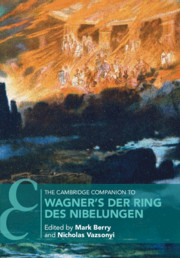Book contents
- The Cambridge Companion to Wagner’s Der Ring des Nibelungen
- Cambridge Companions to Music
- The Cambridge Companion to Wagner’s Der Ring des Nibelungen
- Copyright page
- Contents
- Figures
- Music Examples
- Contributors
- Preface
- Abbreviations
- Introduction
- Part I Myth
- Part II Aesthetics
- Part III Interpretations
- 7 Characters in the “World” of the Ring
- 8 The Ring as a Political and Philosophical Drama
- 9 The Idea of Nature
- 10 Gender and Sexuality
- Part IV Impact
- Bibliography
- Index
8 - The Ring as a Political and Philosophical Drama
from Part III - Interpretations
Published online by Cambridge University Press: 18 September 2020
- The Cambridge Companion to Wagner’s Der Ring des Nibelungen
- Cambridge Companions to Music
- The Cambridge Companion to Wagner’s Der Ring des Nibelungen
- Copyright page
- Contents
- Figures
- Music Examples
- Contributors
- Preface
- Abbreviations
- Introduction
- Part I Myth
- Part II Aesthetics
- Part III Interpretations
- 7 Characters in the “World” of the Ring
- 8 The Ring as a Political and Philosophical Drama
- 9 The Idea of Nature
- 10 Gender and Sexuality
- Part IV Impact
- Bibliography
- Index
Summary
Richard Wagner was a political being throughout his life, even if his various political beliefs and commitments were not necessarily consistent or coherent. These beliefs found their way into his works. This is not surprising. Wagner despised what he saw as the shallowness and superficiality of contemporary opera. He aimed to supplant this with serious and substantial music dramas, of which the Ring is the grandest and most comprehensive example. Its mythological setting and characters can be deceptive. There are many implicit references to contemporary social and economic life. Wagner intended his work to have topical relevance. George Bernard Shaw, an early enthusiast for Wagner, was one of the first to see this. It is a mark of Wagner’s far-sightedness that he made an exploitative attitude to nature one of the key failings in the old order which was to be replaced. But how was this to happen? In his many drafts of Brunnhilde’s final peroration, Wagner evoked both the humanist Ludwig Feuerbach and the pessimist Arthur Schopenhauer. Wagner’s interests were never narrowly musical. He took a keen interest in the philosophical and intellectual currents of his age.
- Type
- Chapter
- Information
- The Cambridge Companion to Wagner's Der Ring des Nibelungen , pp. 185 - 204Publisher: Cambridge University PressPrint publication year: 2020

